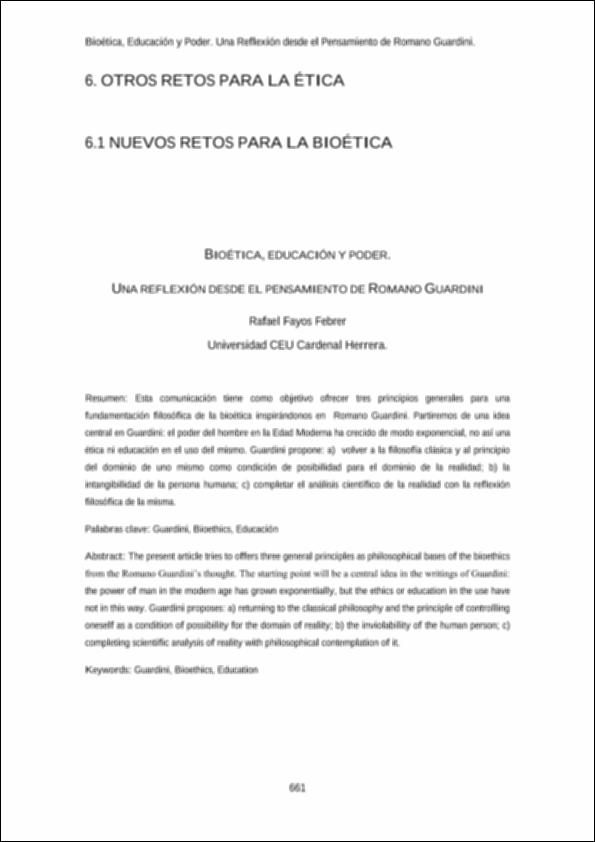Please use this identifier to cite or link to this item:
http://hdl.handle.net/10637/10630Bioética, educación y poder : una reflexión desde el pensamiento de Romano Guardini
| Title: | Bioética, educación y poder : una reflexión desde el pensamiento de Romano Guardini |
| Authors : | Fayos Febrer, Rafael |
| Keywords: | Guardini, Romano, 1885-1968 - Criticism and interpretation.; Guardini, Romano, 1885-1968 - Political and social views.; Guardini, Romano, 1885-1968 - Crítica e interpretación.; Guardini, Romano, 1885-1968 - Pensamiento político y social.; Personalism.; Bioethics.; Persona (Filosofía); Agent (Philosophy); Bioética.; Personalismo. |
| Publisher: | Comares |
| Citation: | Fayos Febrer, R. (2015). Bioética, educación y poder : una reflexión desde el pensamiento de Romano Guardini. En Ortega Esquembre, C., et al. El mejoramiento humano : avances, investigaciones y reflexiones éticas y políticas (pp. 661-670) . Albolote (Granada) : Comares. |
| Abstract: | Esta comunicación tiene como objetivo ofrecer tres principios generales para una fundamentación filosófica de la bioética inspirándonos en Romano Guardini. Partiremos de una idea central en Guardini: el poder del hombre en la Edad Moderna ha crecido de modo exponencial, no así una ética ni educación en el uso del mismo. Guardini propone: a) volver a la filosofía clásica y al principio del dominio de uno mismo como condición de posibilidad para el dominio de la realidad; b) la intangibilidad de la persona humana; c) completar el análisis científico de la realidad con la reflexión filosófica de la misma. / The present article tries to offers three general principles as philosophical bases of the bioethics from the Romano Guardini’s thought. The starting point will be a central idea in the writings of Guardini: the power of man in the modern age has grown exponentially, but the ethics or education in the use have not in this way. Guardini proposes: a) returning to the classical philosophy and the principle of controlling oneself as a condition of possibility for the domain of reality; b) the inviolability of the human person; c) completing scientific analysis of reality with philosophical contemplation of it. |
| URI: | http://hdl.handle.net/10637/10630 |
| Rights : | http://creativecommons.org/licenses/by-nc-nd/4.0/deed.es |
| ISBN: | 9788490453643 |
| Issue Date: | 3-Oct-2015 |
| Center : | Universidad Cardenal Herrera-CEU |
| Appears in Collections: | Dpto. Humanidades |
Items in DSpace are protected by copyright, with all rights reserved, unless otherwise indicated.


